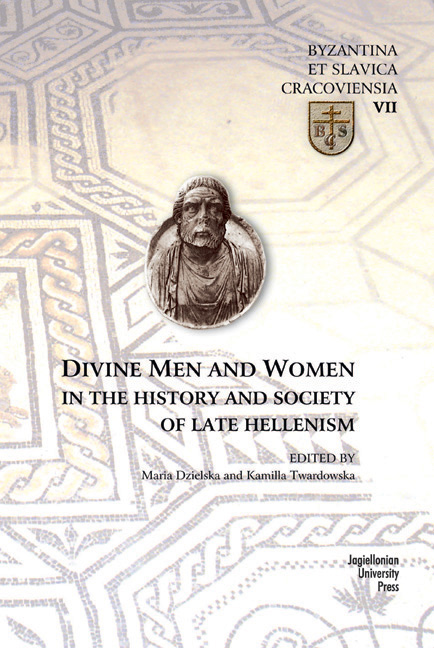Book contents
- Frontmatter
- Contents
- Foreword
- Introduction
- List of participants
- The Divine Man of Late Hellenism: A Sociable and Popular Figure
- Praying, Wonder-Making and Advertising: The Epitynchanoi's Funerary Inscriptions
- Philosophy and Culture as Means to Divine Ascent in Late Antiquity: The Case of Synesius
- Once More on Hypatia's Death
- Boethius — Divine Man or Christian Philospopher?
- Aspects of Divinization According to Farīd-al-dīn ʿAṭṭār Nīšāpūrī (died c. 1221)
- Lecture Halls at Kom el-Dikka in Alexandria
- Salustios — Divine Man of Cynicism in Late Antiquity
- Sosipatra — Role Models for ‘Divine’ Women in Late Antiquity
- Athenais Eudocia — Divine or Christian Woman?
- Damascius' Isidore: Collective Biography and a Perfectly Imperfect Philosophical Exemplar
- Conference photo gallery
Introduction
Published online by Cambridge University Press: 05 December 2014
- Frontmatter
- Contents
- Foreword
- Introduction
- List of participants
- The Divine Man of Late Hellenism: A Sociable and Popular Figure
- Praying, Wonder-Making and Advertising: The Epitynchanoi's Funerary Inscriptions
- Philosophy and Culture as Means to Divine Ascent in Late Antiquity: The Case of Synesius
- Once More on Hypatia's Death
- Boethius — Divine Man or Christian Philospopher?
- Aspects of Divinization According to Farīd-al-dīn ʿAṭṭār Nīšāpūrī (died c. 1221)
- Lecture Halls at Kom el-Dikka in Alexandria
- Salustios — Divine Man of Cynicism in Late Antiquity
- Sosipatra — Role Models for ‘Divine’ Women in Late Antiquity
- Athenais Eudocia — Divine or Christian Woman?
- Damascius' Isidore: Collective Biography and a Perfectly Imperfect Philosophical Exemplar
- Conference photo gallery
Summary
The subject of the conference „Divine Men and Women in the History of Late Hellenism”, held in 2010 at the Jagiellonian Univeristy was not without significance for the Cracow byzantinists. About 30 years ago we started our first conference titled quite similarly: Paganism in the late Roman Empire and in Byzantium. Its originator was Prof. Maria Dzielska, who some years earlier initiated the foundation of our Byzantine Studies Department. Meantime we arranged regularly other scholarly symposia devoted to later periods of Byzantine history and to Byzantino — Slavic relations in the Middle Ages, but the Late Antiquity remained the main subject of our team's research, no wonder that studies in history of the late antique religion and philosophy published by Prof. Dzielska and her collaborators' are the pride of Cracow Byzantinists. Her biographies of Apollonius of Tyana and of Hypatia of Alexandria are read all over the world, the book about the Alexandrian divine woman being translated in about 10 languages. It is now one of the best known Polish scholarly publications in the world. The disciples of Prof. Dzielska follow in the footsteps of her master: Dr. Kamilla Twardowska with her book devoted to the empresses of the 2 half of the V century and Dr. Michał Stachura with his books concerning the attitude of late antique emperors towards the religious and other kind minorities as well as about the language of aggression in the legislation of the Later Empire.
- Type
- Chapter
- Information
- Publisher: Jagiellonian University PressPrint publication year: 2013

